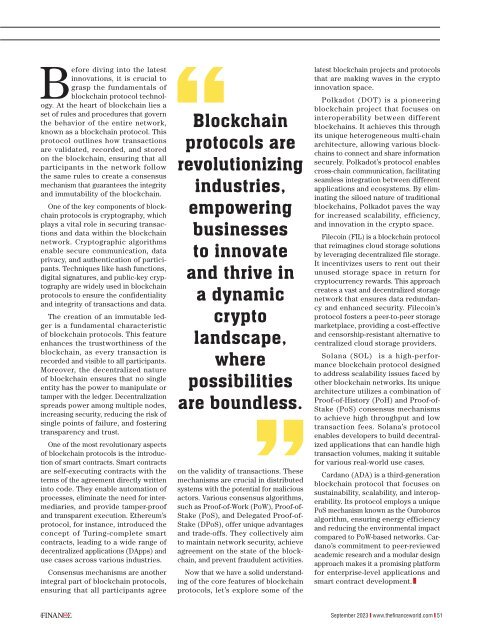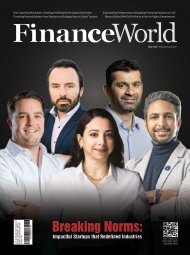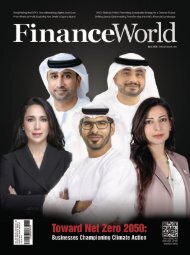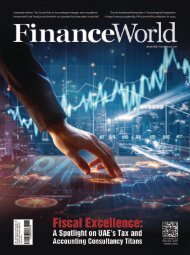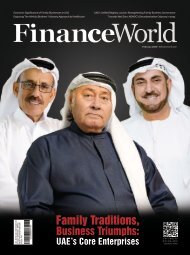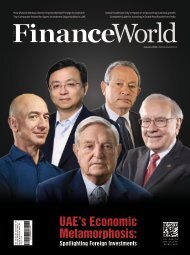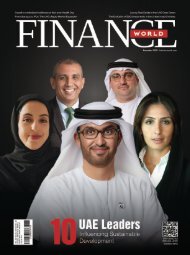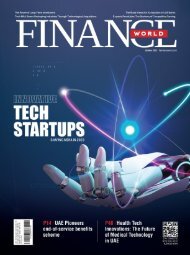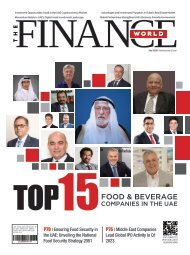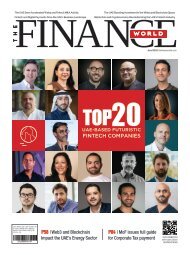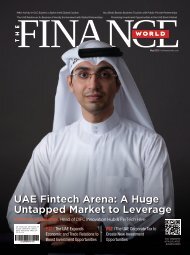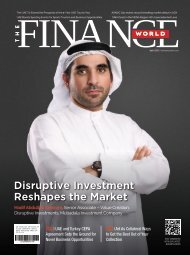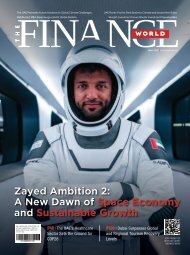The Finance World Magazine| Edition: September 2023
The Middle East is currently experiencing a transformative era characterized by sustainability and governance, known as the Middle East's Green Renaissance. At the heart of this movement is the Environmental, Social, and Governance (ESG) framework, which is reshaping corporate success by placing a strong emphasis on transparency, accountability, and responsible global citizenship. ESG investing is reshaping financial markets, aligning financial gains with societal and environmental impacts. The Middle East has pledged significant net-zero commitments, underscoring its commitment to environmental stewardship. As the Middle East prepares to host COP28 in Dubai, it remains committed to sustainability. This edition explores the Middle East's ESG journey, from milestones to future horizons. This edition provides insightful perspectives across diverse sectors within the UAE. it provides insights on certain areas of focus, such as The Key to Mitigating Risks in Stock Market Portfolios, Cross-Border M&A: Challenges and Opportunities in Global Transactions, Risk Management Best Practices for Ensuring Business Continuity, Fintech Innovations Shaping the Future, and many more articles that offer critical analysis and insights on current trends and issues in the business and investment domains. Keep yourself up to date with all financial sector news with our current news segments. Each person can find something unique from us. We believe our readers deserve real value from what we have to offer.
The Middle East is currently experiencing a transformative era characterized by sustainability and governance, known as the Middle East's Green Renaissance. At the heart of this movement is the Environmental, Social, and Governance (ESG) framework, which is reshaping corporate success by placing a strong emphasis on transparency, accountability, and responsible global citizenship.
ESG investing is reshaping financial markets, aligning financial gains with societal and environmental impacts. The Middle East has pledged significant net-zero commitments, underscoring its commitment to environmental stewardship.
As the Middle East prepares to host COP28 in Dubai, it remains committed to sustainability. This edition explores the Middle East's ESG journey, from milestones to future horizons.
This edition provides insightful perspectives across diverse sectors within the UAE. it provides insights on certain areas of focus, such as The Key to Mitigating Risks in Stock Market Portfolios, Cross-Border M&A: Challenges and Opportunities in Global Transactions, Risk Management Best Practices for Ensuring Business Continuity, Fintech Innovations Shaping the Future, and many more articles that offer critical analysis and insights on current trends and issues in the business and investment domains.
Keep yourself up to date with all financial sector news with our current news segments. Each person can find something unique from us. We believe our readers deserve real value from what we have to offer.
You also want an ePaper? Increase the reach of your titles
YUMPU automatically turns print PDFs into web optimized ePapers that Google loves.
Before diving into the latest<br />
innovations, it is crucial to<br />
grasp the fundamentals of<br />
blockchain protocol technology.<br />
At the heart of blockchain lies a<br />
set of rules and procedures that govern<br />
the behavior of the entire network,<br />
known as a blockchain protocol. This<br />
protocol outlines how transactions<br />
are validated, recorded, and stored<br />
on the blockchain, ensuring that all<br />
participants in the network follow<br />
the same rules to create a consensus<br />
mechanism that guarantees the integrity<br />
and immutability of the blockchain.<br />
One of the key components of blockchain<br />
protocols is cryptography, which<br />
plays a vital role in securing transactions<br />
and data within the blockchain<br />
network. Cryptographic algorithms<br />
enable secure communication, data<br />
privacy, and authentication of participants.<br />
Techniques like hash functions,<br />
digital signatures, and public-key cryptography<br />
are widely used in blockchain<br />
protocols to ensure the confidentiality<br />
and integrity of transactions and data.<br />
<strong>The</strong> creation of an immutable ledger<br />
is a fundamental characteristic<br />
of blockchain protocols. This feature<br />
enhances the trustworthiness of the<br />
blockchain, as every transaction is<br />
recorded and visible to all participants.<br />
Moreover, the decentralized nature<br />
of blockchain ensures that no single<br />
entity has the power to manipulate or<br />
tamper with the ledger. Decentralization<br />
spreads power among multiple nodes,<br />
increasing security, reducing the risk of<br />
single points of failure, and fostering<br />
transparency and trust.<br />
One of the most revolutionary aspects<br />
of blockchain protocols is the introduction<br />
of smart contracts. Smart contracts<br />
are self-executing contracts with the<br />
terms of the agreement directly written<br />
into code. <strong>The</strong>y enable automation of<br />
processes, eliminate the need for intermediaries,<br />
and provide tamper-proof<br />
and transparent execution. Ethereum’s<br />
protocol, for instance, introduced the<br />
concept of Turing-complete smart<br />
contracts, leading to a wide range of<br />
decentralized applications (DApps) and<br />
use cases across various industries.<br />
Consensus mechanisms are another<br />
integral part of blockchain protocols,<br />
ensuring that all participants agree<br />
Blockchain<br />
protocols are<br />
revolutionizing<br />
industries,<br />
empowering<br />
businesses<br />
to innovate<br />
and thrive in<br />
a dynamic<br />
crypto<br />
landscape,<br />
where<br />
possibilities<br />
are boundless.<br />
on the validity of transactions. <strong>The</strong>se<br />
mechanisms are crucial in distributed<br />
systems with the potential for malicious<br />
actors. Various consensus algorithms,<br />
such as Proof-of-Work (PoW), Proof-of-<br />
Stake (PoS), and Delegated Proof-of-<br />
Stake (DPoS), offer unique advantages<br />
and trade-offs. <strong>The</strong>y collectively aim<br />
to maintain network security, achieve<br />
agreement on the state of the blockchain,<br />
and prevent fraudulent activities.<br />
Now that we have a solid understanding<br />
of the core features of blockchain<br />
protocols, let’s explore some of the<br />
latest blockchain projects and protocols<br />
that are making waves in the crypto<br />
innovation space.<br />
Polkadot (DOT) is a pioneering<br />
blockchain project that focuses on<br />
interoperability between different<br />
blockchains. It achieves this through<br />
its unique heterogeneous multi-chain<br />
architecture, allowing various blockchains<br />
to connect and share information<br />
securely. Polkadot’s protocol enables<br />
cross-chain communication, facilitating<br />
seamless integration between different<br />
applications and ecosystems. By eliminating<br />
the siloed nature of traditional<br />
blockchains, Polkadot paves the way<br />
for increased scalability, efficiency,<br />
and innovation in the crypto space.<br />
Filecoin (FIL) is a blockchain protocol<br />
that reimagines cloud storage solutions<br />
by leveraging decentralized file storage.<br />
It incentivizes users to rent out their<br />
unused storage space in return for<br />
cryptocurrency rewards. This approach<br />
creates a vast and decentralized storage<br />
network that ensures data redundancy<br />
and enhanced security. Filecoin’s<br />
protocol fosters a peer-to-peer storage<br />
marketplace, providing a cost-effective<br />
and censorship-resistant alternative to<br />
centralized cloud storage providers.<br />
Solana (SOL) is a high-performance<br />
blockchain protocol designed<br />
to address scalability issues faced by<br />
other blockchain networks. Its unique<br />
architecture utilizes a combination of<br />
Proof-of-History (PoH) and Proof-of-<br />
Stake (PoS) consensus mechanisms<br />
to achieve high throughput and low<br />
transaction fees. Solana’s protocol<br />
enables developers to build decentralized<br />
applications that can handle high<br />
transaction volumes, making it suitable<br />
for various real-world use cases.<br />
Cardano (ADA) is a third-generation<br />
blockchain protocol that focuses on<br />
sustainability, scalability, and interoperability.<br />
Its protocol employs a unique<br />
PoS mechanism known as the Ouroboros<br />
algorithm, ensuring energy efficiency<br />
and reducing the environmental impact<br />
compared to PoW-based networks. Cardano’s<br />
commitment to peer-reviewed<br />
academic research and a modular design<br />
approach makes it a promising platform<br />
for enterprise-level applications and<br />
smart contract development.<br />
<strong>September</strong> <strong>2023</strong> www.thefinanceworld.com 51


